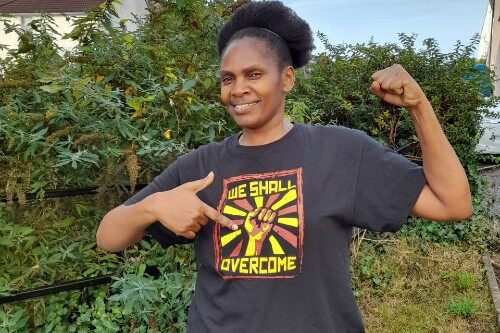“We shall overcome!” – that’s the motto Judith Kibuye has called on to prevail during lockdown and help transform the lives of others. The University of Bristol Masters student channelled her energies and expertise to better understand the needs of residents in Lawrence Hill, one of the most deprived wards in the UK.


The research project, jointly undertaken with undergraduates Nia Jones and Gwendolen Brown, supported community anchor organisation, the Wellspring Settlement, to secure a £98,971 grant, awarded by the COVID-19 Community-led Organisations Recovery Scheme (CCLORS) on behalf of The National Lottery Community Fund.
The Wellspring Settlement formed in February 2020, before the UK went into lockdown, from the merger of the Barton Hill Settlement and the Wellspring Healthy Living Centre. The report helped capture the community’s response to the COVID-19 pandemic and how, with support from the Wellspring Settlement, residents could look forward to a brighter, more resilient future as the restrictions lifted.
Judith, who is studying an MSc in social science research methods, said: “I’m passionate about using evidence-based interventions to improve communities and make a real difference to people’s lives, so being part of this successful project was a dream come true.”
The funding will pilot a training scheme with the Wellspring Settlement called Boost Breakthrough which is designed to help residents recover from difficult financial situations, broaden skills, and develop their ambitions.
“Lots of hard-working people – taxi drivers, hairdressers and many more – lost their livelihoods in lockdown. School closures meant parents had to juggle looking after their children because working from home or paying for childcare wasn’t an option,” Judith said.
“Clear patterns emerged about residents’ changing needs, considering the physical, psychological, and financial challenges they faced. Collectively, they came up with solutions – sometimes simple things like using Whatsapp group to stay in touch and do neighbourly favours, like shopping for people who were self-isolating.”
The survey work also uncovered domestic issues, widely reported in national media but still often unspoken among those directly affected.
“A woman described in the survey how her husband was no longer able to go out to work and how him being at home was a problem. She didn’t elaborate, but it raised sufficient concern to follow up,” Judith said.
This was not an isolated case. A recent interview with another community member drives home what lockdown was like living with domestic issues – and the importance of support from the Wellspring Settlement.
The students’ work was funded by the university’s Temple Quarter Engagement Fund, which aims to nurture initiatives fostering collaboration between staff, students, and city partners.
The university’s involvement dates back more than a century, as it founded the Barton Hill Settlement in 1911 so staff and students could live there and spread enlightenment.
Professor Morag McDermont, Professor of Social Legal Studies, who provided academic supervision of the project, said: “The Wellspring Settlement Research partnership is an important part of the University’s ongoing and historic civic engagement work. It illustrates how collaborative working between the University and communities provides vital research insights, which help identify underrepresented needs and can produce immense potential social value.
“I am delighted the project proved so successful, which bears testimony to the tremendous commitment of our students and great support from all the residents and partner organisations involved. It’s fantastic that these efforts have been rewarded and the Wellspring Settlement will be part of another exciting initiative to further improve the aspirations and prospects of residents.”
Joanne Holmes, Co-Director of Wellspring Settlement, said: “This funding reflects the huge amount of work put in by the Wellspring Settlement team to respond to the extraordinary circumstances facing the community during lockdown. The research students at the University of Bristol produced helped capture what this support meant to local residents – and was used as supporting evidence in the bid.”
CCLORS, which awarded the grant, is run by Power to Change, Locality, The Ubele Initiative and Social Investment Business on behalf of The National Lottery Community Fund.
Judith’s story
Judith, a single mother-of-three from Kenya, is no stranger to adversity.
“It took me more than 10 years to leave an abusive relationship. As soon as I left high school I got married. It was not happy from the start and the circle of violence began almost immediately,” Judith said.
“You make excuses and try to convince yourself this person will change, then you blame yourself. It’s hard to break away, but I knew I had to do it for myself and for my children to set the right example.”
The parallels between her own struggles and those involved in the survey fuelled her passion for the project.
Courage and education were Judith’s salvation. While working in clerical jobs, Judith completed a diploma in business management. She went on to gain two degrees, first studying communication and sociology then following her passion and achieving a Masters in gender and development studies.
“Walking away and being independent has not been an easy path. What I did was frowned upon, coming from a culture which condones violence against women,” Judith said.
While working for the judiciary, she developed her research career and founded the Association of Gender Studies in Africa.
“The office is my house, but I am determined to use my own experience to drive positive change in society through research. I truly believe evidence-based interventions can build communities and be used to improve policy,” she added.
Coming to Bristol having won a Chevening Scholarship was another leap of faith, which involved leaving behind her two grown-up children, who are now studying at university, and her 12-year-old daughter in the care of her sister.
“I chose Bristol because it was the first higher education institute in England to admit women on an equal basis to men,” Judith said. “It was my first time in the UK and when the pandemic hit and we couldn’t go out, I found it extremely hard and felt more isolated than ever away from family and everything that was familiar.”
True to her hard-working and selfless nature, she applied for an internship with the Wellspring Settlement project to analyse data about how residents were coping and could be helped in lockdown.
“If I hadn’t got the internship, I would still have volunteered because the aims of the scheme are so close to my heart and the challenges facing residents mirrored my own,” Judith said. “The work became a lifeline in a very tough time, giving me a renewed sense of purpose and the power to make a positive impact. I built a strong bond with my collaborators Nia and Gwen and whenever we were struggling or hit an obstacle, we supported each other and I would say: ‘We shall overcome!’”
Inspired by her tenacity, Gwen even presented Judith with a T-shirt emblazoned with the phrase.
Judith, travel permitting, will return to Kenya next month to be reunited with her family and embark on her next mission.
“I would love to see something like the Wellspring Settlement in Kenya, so this has been a fantastic learning experience and ultimately I aspire to continue my studies and gain a PhD,” Judith said. “It’s also incredibly rewarding to know our contribution has helped the work to continue in an exciting new direction, which will help empower residents and give them more independence. I hope my own story shows anything is possible when you set your mind to it.”








































